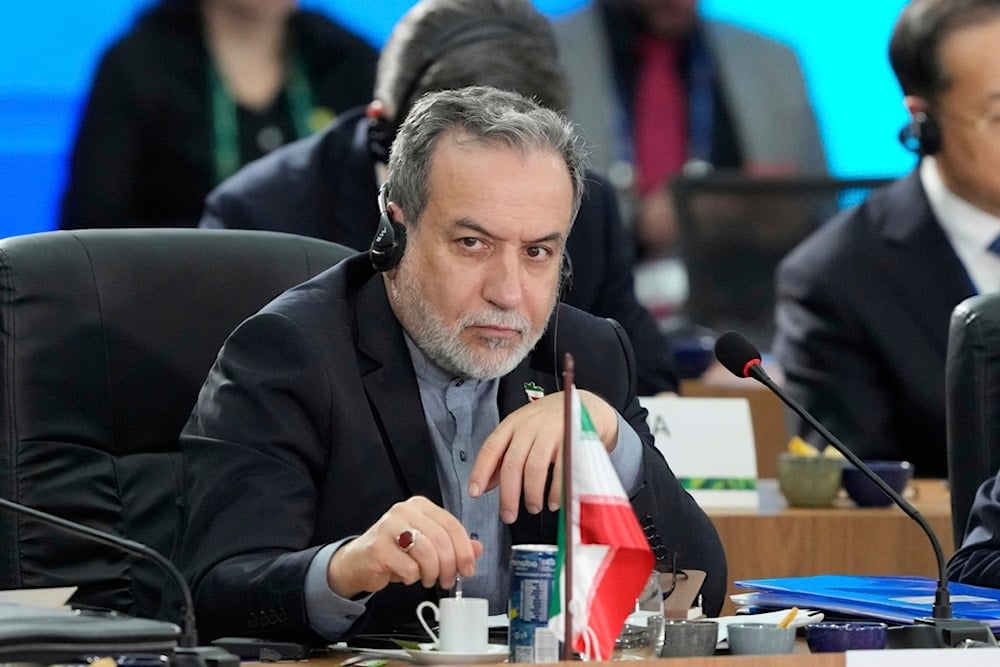Tehran accuses 'Israel' of derailing US talks, warns of wider war: FM
Iran’s Foreign Minister Abbas Araghchi says US-Iran nuclear talks made major progress until “Israel” launched strikes that sabotaged diplomacy and revived tensions.
-

Iranian Foreign Minister Abbas Araghchi attends the 17th annual BRICS summit in Rio de Janeiro, Sunday, July 6, 2025. (AP)
Iranian Foreign Minister Abbas Araghchi has accused the Israeli regime of deliberately sabotaging a promising diplomatic track between Tehran and Washington, warning that further escalation could risk a region-wide war while calling on the US to prioritize diplomacy over "foreign entanglements."
In a Financial Times opinion piece published Tuesday, Araghchi revealed that five recent meetings with US Special Envoy Steve Witkoff had produced more tangible results than years of previous negotiations under the Biden administration. These discussions, he said, focused not only on uranium enrichment and nuclear safeguards but also on broad economic cooperation, which he described as a "trillion-dollar opportunity" for both countries.
“We were on the cusp of a historic breakthrough,” Araghchi wrote, crediting both sides, as well as mediators like Oman, for offering innovative, mutually beneficial proposals. The Iranian official said Iran was open to economic collaboration that would “electrify the Iranian economy” and help revive struggling American industries, including nuclear energy.
But hopes for progress were dashed, he said, just 48 hours before a scheduled sixth round of talks, when the Israeli regime launched an unprovoked military assault on Iranian territory.
'Profound betrayal of diplomacy'
According to Araghchi, the assault targeted nuclear facilities, hospitals, energy infrastructure, and civilian sites, including homes and prisons, killing academics and their families in what he described as "cowardly acts of aggression". He called the attack a “profound betrayal of diplomacy,” asserting that it clearly demonstrated that “Israel prefers conflict over resolution.”
While “Israel” claimed its attacks were aimed at preventing Iran from developing nuclear weapons, Araghchi rejected those assertions, reiterating that Iran remains a signatory to the Non-Proliferation Treaty and has kept its nuclear activities under UN monitoring.
Araghchi noted that Iran responded militarily to the strikes, resisting until the Israeli regime, he said, was forced to rely on President Donald Trump to end the war. “Our commitment to acting responsibly to avoid a full-scale regional war should not be misinterpreted as weakness,” he warned. “We will defeat any future attack… and reveal our real capabilities to dispel any illusions about Iran’s power.”
Sabotaged talks, fractured trust
The foreign minister said that the diplomatic momentum between Iran and the US was not derailed by Tehran, but by what he called an "ostensible ally" of Washington. He also criticized the US for allowing itself to be “cajoled into undermining international law” by launching its own strikes in the wake of the Israeli bombardment.
Although Araghchi acknowledged that Tehran had received recent messages from Washington indicating an interest in returning to talks, he questioned the credibility of such overtures. “How can we trust further engagement?” he asked, citing the US’ unilateral withdrawal from the 2015 nuclear deal and the recent attacks by two nuclear-armed militaries.
Iran, he said, remains open to diplomacy but would not agree to what it sees as surrender. “Iranians will never agree to surrender,” he wrote. “Iran is a millennia-old civilization that has overcome countless invasions, emerging stronger each time.”
'America First' becoming 'Israel First'
In a sharp rebuke of US foreign policy, Araghchi warned that Washington was being “pushed towards a wholly avoidable and unwarranted war by a foreign regime that does not share their interests.” He criticized what he called the distortion of Trump’s “America First” doctrine into “Israel First,” arguing that it has come at the expense of American lives and taxpayer dollars.
“For diplomacy to succeed,” he concluded, “it must be built on mutual respect. Nor can it survive perpetual sabotage by third parties who fear a resolution.”
Araghchi urged the US to make a fundamental choice: “Will the US finally choose diplomacy? Or will it remain ensnared in someone else’s war?”
Iran says trust is broken
Iranian officials confirmed on Tuesday that the United States has conveyed messages expressing interest in resuming nuclear negotiations, but skepticism over Washington’s intentions continues to cloud prospects for renewed diplomacy.
Saeed Khatibzadeh, Assistant to Iran's Foreign Minister, said that Tehran had received several indirect messages from the US in recent days indicating a desire to return to the negotiating table. However, he stressed that meaningful talks require a basic level of trust, something he argued has been undermined by recent hostile actions.
"Negotiations require a minimum level of trust, and the blatant aggression against Iran has practically left no room for it," Khatibzadeh said, referencing what Tehran describes as a US assault on its nuclear facilities. He further noted that Iran was "in the middle of negotiations" when the attack occurred, adding, "We were also in talks with the Europeans at the time of the American strike."
Despite this, he reaffirmed that diplomacy has "always been the fundamental principle" of Iran’s foreign policy.
According to the Iranian news agency Mehr, a well-informed source stated that the United States, through mediators from several countries, had sent a formal request to Iran to resume discussions concerning its nuclear program.

 5 Min Read
5 Min Read










